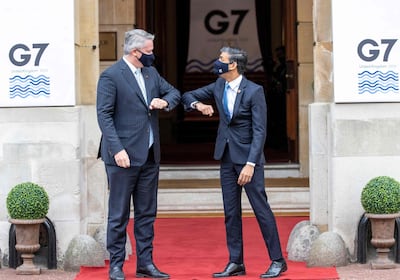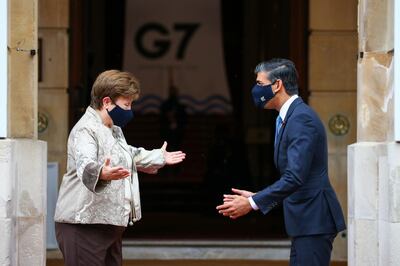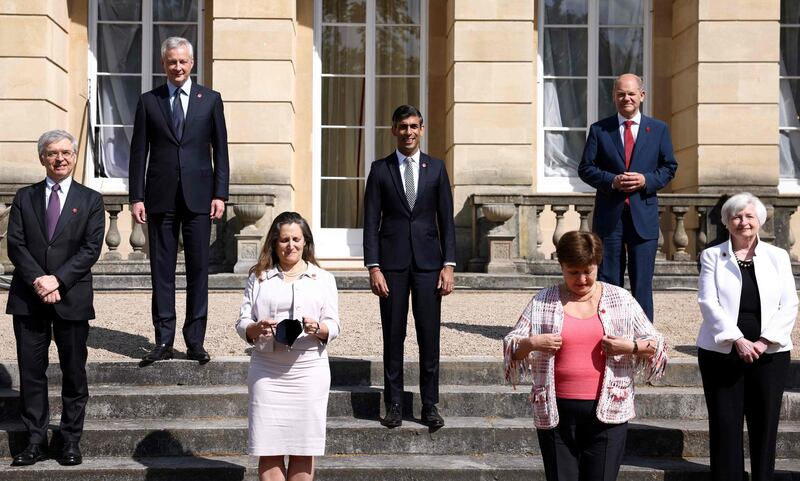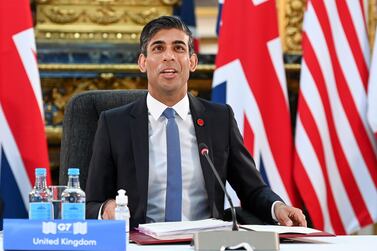The Group of Seven high-income countries agreed on a "historic" deal that will result in a minimum corporate tax rate of at least 15 per cent, the UK's finance minister said.
The agreement to reform the global tax system would make it "fit for the global digital age" and ensure technology companies paid their fair share, Rishi Sunak said.
"That global minimum tax would end the race-to-the-bottom in corporate taxation, and ensure fairness for the middle class and working people in the US and around the world," US Treasury Secretary Janet Yellen said.
French Finance Minister Bruno Le Maire described the deal as "starting point" and said the G7 would fight "to ensure that this minimum corporate tax rate is as high as possible".
The G7 hopes to reach a final agreement at the July gathering of the expanded G20 finance ministers group, it added
Finance leaders from the US, Japan, France, Canada, Germany and Italy had been discussing the global minimum tax rate in London with Mr Sunak, in the first in-person meeting since the start of the pandemic, as the part of the UK's G7 presidency.
Under the principles of the reform, "the largest global firms with profit margins of at least 10 per cent" will be taxed more equitably, with 20 per cent of any profit above a 10 per cent margin taxed in countries where they make sales, according to the UK's finance ministry.
It said the G7 "also followed the UK’s lead by giving a commitment to make it mandatory for firms to report the climate impact of their investment decisions – and concrete steps to crack down on environmental criminals".
The agreement comes after US President Joe Biden's administration gave impetus to stalled global tax talks this year by agreeing to a minimum corporation tax rate of at least 15 per cent last month – well below the average in the G7.
Wealthy nations have struggled for years to agree on a way to raise more tax from large multinationals such as Google, Amazon and Facebook, which often book profits in jurisdictions where they pay little or no tax.
This includes Ireland, which currently has a 12.5 per cent corporate levy. It has been resistant to a higher levy.
“Even Ireland must understand they have to give agreement to this major breakthrough,” Mr Le Maire said on Friday.
The minimum rate aims to prevent major corporations from cheating the system by shifting profits to countries with low corporate tax rates, while also boosting governments' revenue after the coronavirus pandemic.
A G7 agreement to establish a minimum tax rate on big tech and other companies could bring in more than $200 billion a year in revenue for British and EU governments if a higher tax rate of 25 per cent were agreed to by the G7, research released by the European Tax Observatory shows.
At the @G7 in London today, Chancellor @RishiSunak and his counterparts came to a historic agreement on global tax reform that will require the largest multinational tech giants will pay their fair share of tax in the UK. pic.twitter.com/NV9D82T5bX
— HM Treasury (@hmtreasury) June 5, 2021
Mr Sunak, who greeted leaders by bumping elbows rather than shaking hands to comply with Covid-19 restrictions, told ministers that the rest of the world was watching.
"We cannot continue to rely on a tax system that was largely designed in the 1920s," he said.

Mr Sunak said he wants to ensure "companies pay the right amount of tax in the right place", so that multinationals pay more tax where they make their sales – not just where they book profits, or locate their headquarters.
The application of a new global corporation tax rate will also lead to "the removal of all Digital Services Taxes, and other relevant similar measures, on all companies", a communique issued by G7 finance ministers and central bank heads said on Saturday.

The G7 leaders said they would progress measures "and look forward to reaching an agreement at the July meeting of G20 Finance Ministers and Central Bank Governors".
The G20 meeting is set to take place in Venice next month.
The G7 accord is part of a much broader, existing effort. The Organisation for Economic Co-operation and Development has been co-ordinating tax negotiations among 140 countries for years on rules for taxing cross-border digital services and curbing tax base erosion, including a global corporate minimum tax.
The OECD’s new secretary-general, Mathias Cormann, who took office last week, welcomed the signing of the agreement.
“Governments around the world need to be able to raise the necessary revenue to fund the essential public services and support that their populations require and expect, in a way that is efficient, least distorting and also fair and equitable”, Mr Cormann said.
“The combined effect of the globalisation and the digitalisation of our economies has caused distortions and inequities which can only be effectively addressed through a multilaterally agreed solution.







